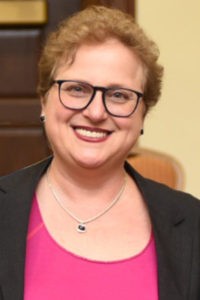
Roslyn F. Schneider, MD, MSc, FCCP, the global patient affairs lead at Pfizer, addressed several myths facing women during the CHEST Foundation’s second annual Women and Pulmonary Luncheon on Sunday. The event brought together key opinion leaders and participants to support the advancement of women in the fields of pulmonary, critical care, sleep medicine, and in leadership.
The first myth Dr. Schneider addressed was negotiation. Women often think there’s no room for negotiation, she said, and they certainly don’t do it when it comes to compensation, benefits, protected research time, and a whole host of other things. And that needs to change.
“We should think about [negotiating] before accepting an offer,” she said. “You should go in there with some sort of idea of what it is I want, what I am willing to give up, and what I am going to dig my heels in on, she said. “…Don’t underestimate what you’re bringing to the table.”
Dr. Schneider also addressed the visibility and value myth. People often say “the work speaks for itself,” but it doesn’t, she emphasized. One way to raise your visibility is networking “beyond your usual suspects,” she advised.
“Develop and build your network before you need it,” she said. “Connect from time to time so they know who you are and what you’re interested in.”
Another myth is “people who have more experience than you, love you, and want you to succeed know exactly what’s best for you.”
“And they don’t. Think about it as: this is your path, your profession, and they are all consultants, but you get to make the decision, because you called in the consultants,” Dr. Schneider said.
Women also tend to not apply for jobs when they don’t meet every single job description, but men tend to apply if they only meet a few. She encouraged women to put themselves out there any apply.
The reason she brought all of these myths up is due to the gender gap in titles, compensation, and in the formal and informal roles women have in health care.
World Health Organization data shows that women are 75% of the paid workforce in health care, and there’s an overall pay gap of around 20%, she said.
“Now is the time that we flip things around—that we don’t wait for others to tell us when we’re ready for something, but that we decide when it’s our time,” Dr. Schneider said.



